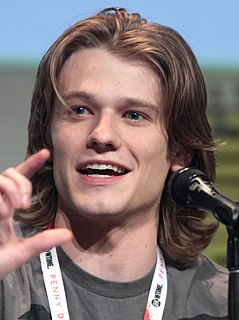A Quote by Mary Oliver
The end of life has its own nature, also worth our attention. I don't say this without reckoning in the sorrow, the worry, the many diminishments. But surely it is then that a person's character shines or glooms.
Related Quotes
There exists a powerful energizing force in the spiritual life principle. All energy began with the Creator, who infused it not only in all natural processes, but also into that higher form of nature called human nature. The more closely, then, that a person identifies with the Creator, the more surely that person will experience within his or her own nature the process of re-creation which operates in all creation.
Through compassion it is possible to recognize that the craving for love that people feel resides also in our own hearts, that the cruelty the world knows all too well is also rooted in our own impulses. Through compassion we also sense our hope for forgiveness in our friends' eyes and our hatred in their bitter mouths. When they kill, we know that we could have done it; when they give life, we know that we can do the same. For a compassionate person nothing human is alien: no joy and no sorrow, no way of living and no way of dying.
I went from one to the other holding my sorrow - no, not my sorrow but the incomprehensible nature of this our life - for their inspection. Some people go to priests; others to poetry; I to my friends, I to my own heart, I to seek among phrases and fragments something unbroken - I to whom there is no beauty enough in moon or tree; to whom the touch of one person with another is all, yet who cannot grasp even that, who am so imperfect, so weak, so unspeakably lonely.
What happens to the mind of a person, and the moral fabric of a nation, that accepts the aborting of the life of a baby without a pang of conscience? What kind of a person and what kind of a society will we have twenty years hence if life can be taken so casually? It is that question, the question of our attitude, our value system, and our mind-set with regard to the nature and worth of life itself that is the central question confronting mankind. Failure to answer that question affirmatively may leave us with a hell right here on earth.
It is abundantly evident that, however natural it may be for us to feel sorrow at the death of our relatives, that sorrow is an error and an evil, and we ought to overcome it. There is no need to sorrow for them, for they have passed into a far wider and happier life. If we sorrow for our own fancied separation from them, we are in the first place weeping over an illusion, for in truth they are not separated from us; and secondly, we are acting selfishly, because we are thinking more of our own apparent loss than of their great and real gain.
The dignity to be sought in death is the appreciation by others of what one has been in life,... that proceeds from a life well lived and from the acceptance of one's own death as a necessary process of nature.... It is also the recognition that the real event taking place at the end of our life is our death, not the attempts to prevent it.
Life is legal tender, and individual character stamps its value. We are from a thousand mints, and all genuine. Despite our infinitely diverse appraisements, we make change for one another. So many ideals planted are worth the great gold of Socrates; so many impious laws broken are worth John Brown.
Many psychologists ... thought by turning their attention to their own consciousness to be able to explain what happened when we were thnking. Or they sought to attain the same end by asking another person a question, by means of which certain processes of thought would be excited, and then by questioning the person about the introspection he had made. It is obvious ... that nothing can be discovered in such experiments.
Our Nation, a great stage for the acting out of great thoughts, presents the classic confrontation between Locke's views of the state of nature and Rousseau's criticism of them... Nature is raw material, worthless without the mixture of human labor; yet nature is also the highest and most sacred thing. The same people who struggle to save the snail-darter bless the pill, worry about hunting deer and defend abortion. Reverence for nature, mastery of nature- whichever is convenient.
Does character develop over time? In novels, of course it does: otherwise there wouldn't be much of a story. But in life? I sometimes wonder. Our attitudes and opinions change, we develop new habits and eccentricities; but that's something different, more like decoration. Perhaps character resembles intelligence, except that character peaks a little later: between twenty and thirty, say. And after that, we're just stuck with what we've got. We're on our own. If so, that would explain a lot of lives, wouldn't it? And also - if this isn't too grand a word - our tragedy.
Recently, one friend asked me, "How can I force myself to smile when I am filled with sorrow? It isn't natural." I told her she must be able to smile to her sorrow, because we are more than our sorrow. A human being is like a television set with millions of channels. If we turn the Buddha on, we are the Buddha. If we turn sorrow on then we are sorrow. If we turn a smile on, we really are the smile. We can not let just one channel dominate us. We have the seed of everything in us, and we have to seize the situation in our hand, to recover our own sovereignty.






































